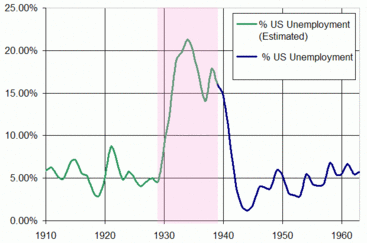The shadow health minister Andrew Lansley was criticised earlier this year when he pointed out that, fiscally painful as they are, recessions are nonetheless good for a nation's health.
 Now there's more scientific evidence to support that claim thanks to a paper in the current edition of PNAS by University of Michigan researchers Jose Tapia Granados and Ana Diez Roux. The duo have compared the state of the US economy over the period straddling the Great Depression of the 1930s with the population mortality rates over the same period, with striking results.
Now there's more scientific evidence to support that claim thanks to a paper in the current edition of PNAS by University of Michigan researchers Jose Tapia Granados and Ana Diez Roux. The duo have compared the state of the US economy over the period straddling the Great Depression of the 1930s with the population mortality rates over the same period, with striking results.
The years 1923, 1926, 1929 and 1936-37, they report, were all economic booms and on each of these years the population mortality peaked. But in 1921, 1930-33 and 1938, which were all recessions or depressions, the death rate fell to its lowest levels. Initially this seems surprising because one would assume that during recessions people would be financially stretched, have little money for healthcare and healthy living and would be generally more stressed, all of which would translate into a high risk of dying. But instead the reverse appears to be true.
Some have suggested that this relationship reflects a lag effect, whereby people become ill during a recession but by the time they die the economy is booming again. The researchers discount this theory on the grounds that the timing just doesn't work because the periods between boom and bust are not constant each time yet the mortality rates change directly in step with the state of the economy.
 Instead, they point out that although a fast-growing economy might be good for your bank balance it is potentially very bad for the health of the populace because people tend to work longer hours during a boom, they have more disposable income to spend on alcohol and cigarettes, consumption of which is known to increase at times of prosperity, there is also more traffic, more pollution and industrial accidents are more frequent. People often migrate in search of lucrative high-paid work, leading to social isolation. All of these factors add up to more ill-health during the so-called good times. So, rather than rue the recession, welcome it with open arms...and see how long your bank manager will swallow the story that your empty account and maxed-out credit card are all part of a healthier lifestyle...!
Instead, they point out that although a fast-growing economy might be good for your bank balance it is potentially very bad for the health of the populace because people tend to work longer hours during a boom, they have more disposable income to spend on alcohol and cigarettes, consumption of which is known to increase at times of prosperity, there is also more traffic, more pollution and industrial accidents are more frequent. People often migrate in search of lucrative high-paid work, leading to social isolation. All of these factors add up to more ill-health during the so-called good times. So, rather than rue the recession, welcome it with open arms...and see how long your bank manager will swallow the story that your empty account and maxed-out credit card are all part of a healthier lifestyle...!










Comments
Add a comment